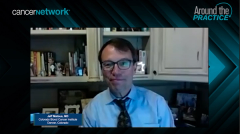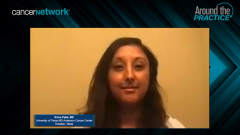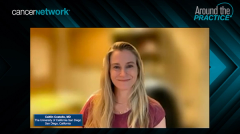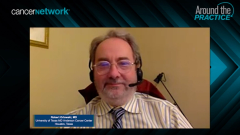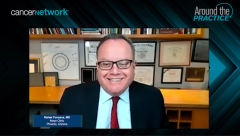
BCMA-Targeting Bispecific Agents for Relapsed/Refractory Multiple Myeloma Treatment
An overview of BCMA-targeting bispecific agents in development for multiple myeloma, including talquetamab and teclistamab.
Rafael Fonseca, MD: Dr Orlowski, we saw the MonumenTAL-1 study with talquetamab, which is a different target, but what was your take from that study as well?
Robert Orlowski, MD: Talquetamab goes after a different cell surface protein on myeloma cells, GPRC5D. The exciting thing about that is that if the BCMA-targeted therapies stopped working, we could maybe switch to a similar mechanism but against a different target. This was the study of 2 different doses and schedules of this drug, and the response rate in the studies was quite good. Depending on the arm, the response rate was about 67% to 70%. About 10% of patients had complete remissions, and the median duration of response had not yet been met.
About three quarters of patients had cytokine release syndrome [CRS], but the majority were grade 1, with fewer events being grade 2 or grade 3. There was some neutropenia as well as lymphopenia, but most of that was relatively easy to take care of. Some of these patients had prior BCMA therapy, although the results weren’t reported separately for those people, so we don’t know if we can do BCMA target first and then GPRC5D afterwards, but that would be the hope. Or maybe even the opposite direction. It depends on what the results ultimately show.
Rafael Fonseca, MD: Excellent. That’s not all we have. We also have FcRH5 and a continued growth of options. Dr Costello, if we had them available, how do they fit in the treatment landscape for myeloma? Dr Patel seems to be affiliated with CAR [chimeric antigen receptor] T cells, but the bispecifics are very attractive, too.
Caitlin Costello, MD: The first important thing to do is take a quick step back and say, “Did you just hear those response rates?” We’re talking about heavily pretreated patients with 15 prior lines of therapy. The approvals that we’ve seen in drugs have historically had response rates of 20% to 30% with single agents, and they just said things like 60%, 70%, 80%-plus. First and foremost, by itself, these single agents are active agents.
We have to try to figure out how to get people, or I should say facilities and physicians and hospitals, whether that be academic or community practices, to be a little more comfortable with the management of CRS and the neurotoxicity. Maybe some hybrid approach is going to be the way that we do this, where patients initially get their treatment once approved at an academic center and then can go back to their community practices in order to continue it. That’s going to be 1 barrier that will have to be overcome.
But overall, these are responses we’re seeing with patients who are so heavily pretreated, maybe their T cells aren’t even working all that well. If we’re seeing responses now, how is it going to work when we use it in earlier lines of therapy? For the meantime, as Dr Orlowski referred to, we’re looking at BCMA as our main target. Whether we’re looking at BCMA-targeting bispecifics for first-line therapy or when we’re looking at bispecifics, then maybe we’ll go on to other targets. Where it’s going to end up for the meantime is probably going to depend on approvals and what drug you have available to you. Because right now, it seems like we have such a dearth of availability when it comes to late relapses, so you’re going to end up grabbing whatever you have access to.
Rafael Fonseca, MD: Excellent points. Jeff?
Jeff Matous, MD: I have a couple other points. I’m excited about the combinations with the bispecifics that are out there. These are all in clinical trials right now. You name the combination, and it’s probably being evaluated. That’s exciting to be able to offer that to patients as well.
Transcript edited for clarity.
Newsletter
Stay up to date on recent advances in the multidisciplinary approach to cancer.


